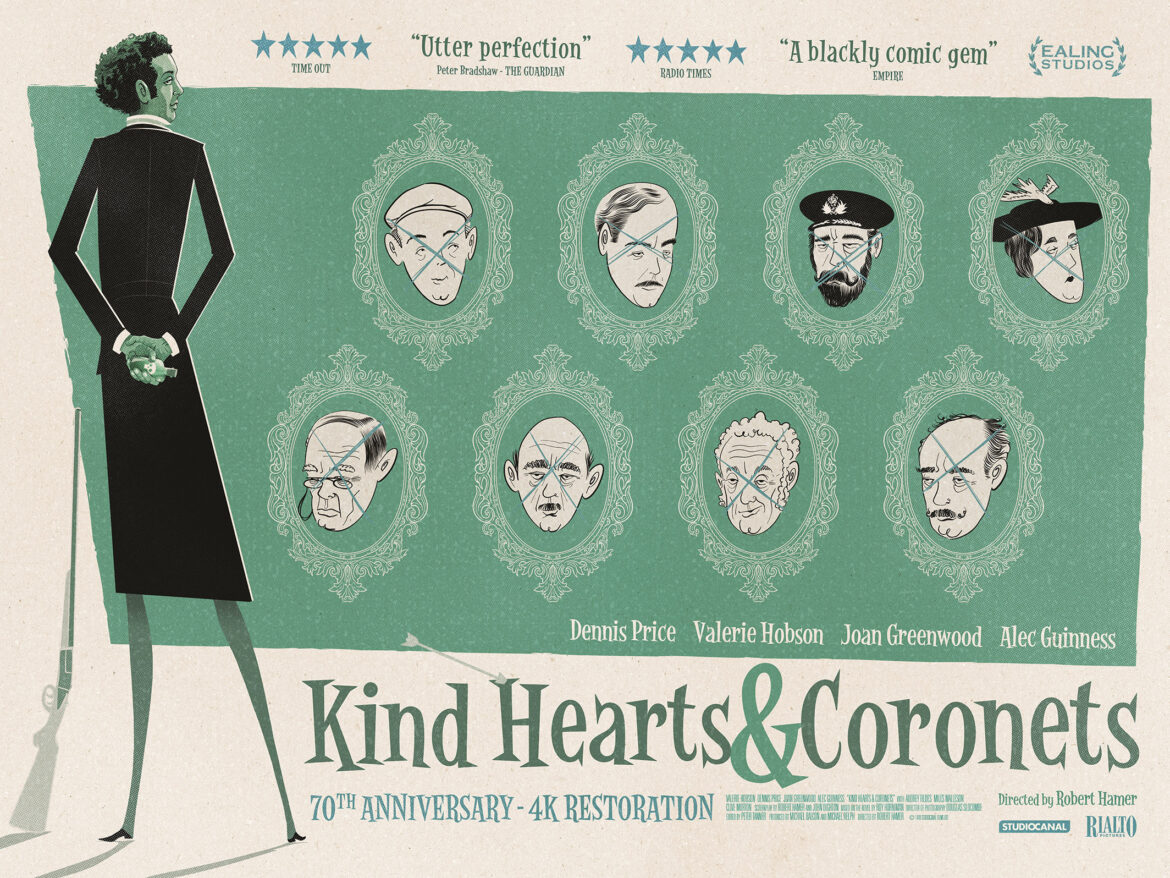Kind Hearts and Coronets (1949) – A Darkly Comedic Masterpiece of British Cinema
Type: Movie
Country: United Kingdom
Genre: Black Comedy, Crime
Release Date: June 13, 1949
Duration: 106 minutes
Director: Robert Hamer
Production Companies: Ealing Studios
Cast: Dennis Price, Alec Guinness, Valerie Hobson, Joan Greenwood
Quick Review:
“Kind Hearts and Coronets” (1949) is a quintessential British black comedy directed by Robert Hamer. The film, produced by Ealing Studios, stars Dennis Price and Alec Guinness in a macabre yet humorous tale of revenge and ambition. Known for its witty dialogue and ingenious plot, this classic film remains a staple of British cinema.
Plot Summary:
Set in Edwardian England, “Kind Hearts and Coronets” follows the story of Louis D’Ascoyne Mazzini (Dennis Price), the son of a disinherited noblewoman. After his mother’s death and his exclusion from the family, Louis vows to reclaim his birthright by eliminating the eight heirs standing between him and the dukedom of Chalfont.
Each of these heirs, played with remarkable versatility by Alec Guinness, presents a unique challenge. From an arrogant duke to a dotty admiral, Louis methodically and often humorously disposes of his relatives. As he carries out his plan, Louis navigates romantic entanglements with his childhood sweetheart Sibella (Joan Greenwood) and the virtuous Edith (Valerie Hobson).
The film reaches its climax as Louis finally ascends to the dukedom, only to face an ironic twist of fate that questions the morality of his actions and the value of his relentless pursuit of power.
Characters and Performances:
- Dennis Price (Louis D’Ascoyne Mazzini): Price delivers a stellar performance as the cold, calculating protagonist. His portrayal of Louis is both charming and chilling, capturing the character’s ruthless ambition and dry wit.
- Alec Guinness (The D’Ascoyne Family): Guinness’s remarkable ability to play multiple roles is the film’s standout feature. His nuanced performances as eight distinct members of the D’Ascoyne family showcase his extraordinary talent and versatility, adding a layer of dark humor to each character’s demise.
- Joan Greenwood (Sibella): Greenwood brings a delightful blend of seductiveness and cunning to Sibella, Louis’s manipulative love interest. Her chemistry with Price adds depth to their morally ambiguous relationship.
- Valerie Hobson (Edith): Hobson’s portrayal of Edith, the virtuous widow, provides a stark contrast to Greenwood’s Sibella. Her performance embodies grace and integrity, highlighting the moral dilemmas faced by Louis.
Direction and Cinematography:
Robert Hamer’s direction is masterful, seamlessly blending dark comedy with social satire. The film’s pacing is precise, maintaining a balance between suspense and humor. The cinematography by Douglas Slocombe captures the elegance of Edwardian England, with meticulous attention to period detail.
The use of voice-over narration by Dennis Price adds a layer of sophistication and wit to the storytelling, allowing the audience to delve into Louis’s calculating mind. Hamer’s ability to navigate complex themes of class, revenge, and morality without losing the film’s comedic edge is a testament to his directorial prowess.
Music:
The musical score by Ernest Irving complements the film’s tone perfectly. The use of classical pieces, particularly from Gilbert and Sullivan, adds a touch of irony and sophistication. The music enhances the narrative, reflecting the film’s blend of dark humor and elegance.
Why It Endures:
“Kind Hearts and Coronets” endures as a classic due to its brilliant script, exceptional performances, and timeless themes. The film’s exploration of ambition, revenge, and morality remains relevant, while its sharp wit and dark humor continue to entertain audiences. Alec Guinness’s tour de force performance and the film’s innovative narrative structure set it apart as a landmark in British cinema.
In Conclusion:
“Kind Hearts and Coronets” (1949) is a darkly comedic gem that stands the test of time. With outstanding performances from Dennis Price and Alec Guinness, sharp direction by Robert Hamer, and a witty, engaging script, the film offers a rich cinematic experience. Its blend of humor, social commentary, and suspense ensures its place as a beloved classic in the annals of British cinema.


